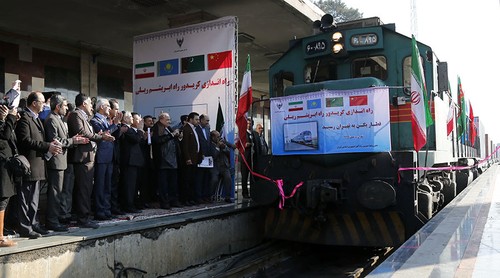(VOVworld)- The first freight train to resurrect the ancient Silk Road route arrived in Iran from China on Monday. The two countries want to revive the trans-Asia trade route linking Asia with Europe and the Mediterranean sea.

Iranian officials applaud on the platform as the first train connecting China and Iran arrives at Tehran Railway Station on February 15, 2016. © Stringer / AFP
|
It took just 14 days for the 32-container train loaded with Chinese goods to complete the 9,500km journey from China’s eastern Zhejiang province through Kazakhstan and Turkmenistan. That's 30 days shorter than the sea voyage from Shanghai to the Iranian port of Bandar Abbas, according to the head of the Iranian railway company, Mohsen Pourseyed Aqayi. He said the arrival of this train in less than 14 days is unprecedented and that the revival of the Silk Road is crucial for the countries along the route. Aqayi says there will be a train every month and more frequently if necessary. The railway will not stop in Tehran, Aqayi said as they are planning to extend the railway to Europe in the future with transits generating income for Iran. China is Iran’s biggest trading partner. The first trainload of goods between China and Iran was part of agreements signed during Chinese President Xi Jinping’s visit to Iran in January, after the West removed sanctions on Iran following a nuclear deal reached between Iran and the P5+1 group which the US, Russia, the UK, France, China, and Germany.
China has expanded its economic cooperation with Iran which occupies a strategic position in the Middle East.
The Silk Road is an ancient trans-Asian trade route connecting China to Europe and the Mediterranean Sea. The route was named for the lucrative Chinese silk trade. In 2013, Beijing announced an ambitious foreign policy initiative known as ‘One Belt One Road’. Beijing pledged to invest more than 200 billion USD in building roads, ports, railway systems and other infrastructure around the globe. The project is expected to boost the world’s second largest economy.